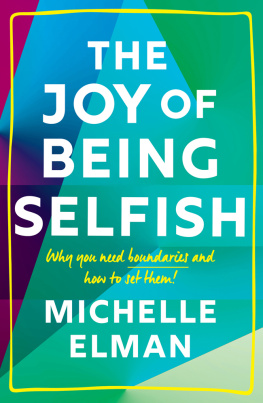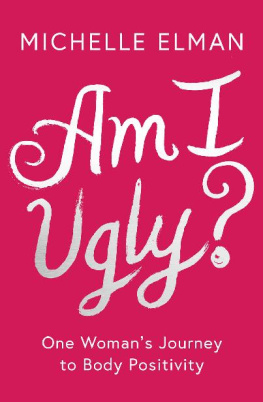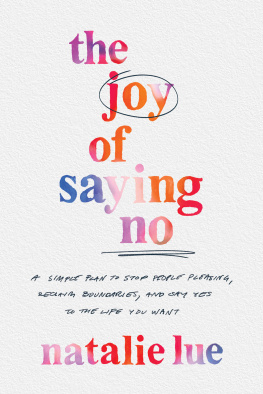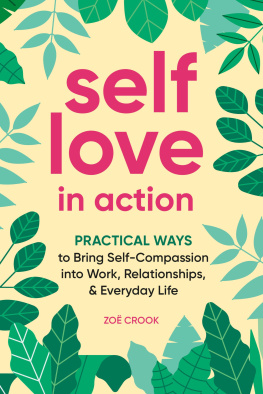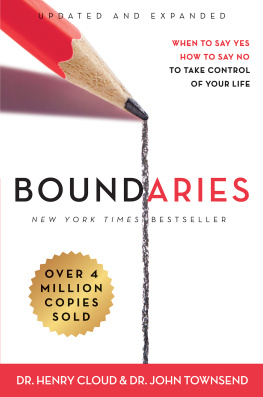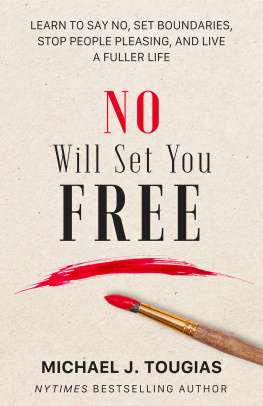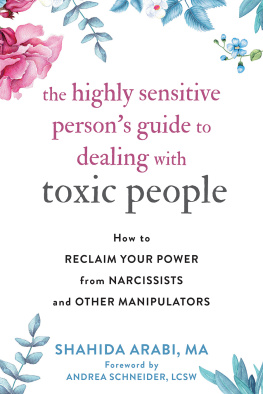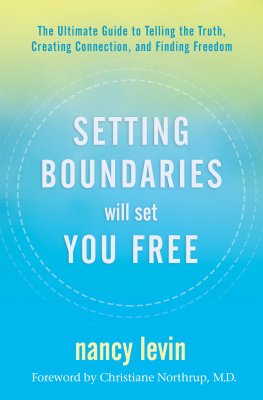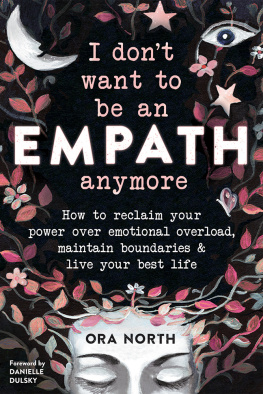For every woman who has been treated badly and wondered
whether you deserved it you dont.
AUTHORS NOTE
Some of the names and identifying details in this book have been changed to protect the privacy of the people in the examples used. All stories involving clients have been included with their permission.
CONTENTS
Selfish (adj.): Seeking or concentrating on ones own advantage, pleasure or well-being without regard for others
Self-love is a concept everyone can get on board with as long as you have done what you need to do for everyone else first. The problem is, once youve done that, there is usually no time or energy left for yourself. Often, we are so quick to take care of others, but it is important to recognize that there is a cost to this: you. Its coming at the expense of your own self-care. Here is where boundaries become important. Boundaries are the practical side of self-love. Its the part that no one wants to talk about because it flies in the face of the narrative that in order to be a good person, you need to put others needs before your own, and if you do put your needs first and foremost, you are considered selfish. Self-love means saying, Im going to love myself and not make it anyone elses job. Setting boundaries means saying, Im going to get my needs met and Im not going to expect others to do it for me. If thats selfish, then Im selfish.
Controversial or not, I believe in order to have self-love, it is necessary to be selfish. It requires you to reorder your priorities to ensure you come at the top of that list. The word selfish holds a stigma in modern society because it is associated with the idea that you have a disregard for other humans. But when you regard others more highly than yourself, the unfortunate consequence is often that you are completely forgotten. I think one of the most loving things you can do for the people around you is to take care of yourself. When you dont, the people in your life often feel a responsibility to do that duty for you.
Conversely, selfless people in our society are often praised but those who act like they are selfless are hiding behind the fact that they are too scared to ask for what they want. Take the example of the person who is so selfless that when you ask them where they want to eat, they dont know. Its your choice and they dont mind, no matter how many times you ask them. It might seem kind of them, but when you are put in this position often enough, it becomes exhausting because you end up having to read their mind. Do they truly not care, or are they just not vocalizing what they truly feel? Many of these people dont know what they want because they either have never been asked, or were so often ignored when they did ask that they stopped asking. Either way, selflessness is not about being good, its about being liked. It is deriving self-esteem from your usefulness to and approval by others, and holding that above your own needs.
The ironic thing is that most people who pride themselves on selflessness are not being selfless for others, but actually for themselves. They do everything for others to fill a void in themselves that they are unwilling to confront. They make sacrifices that no one asked them to make, which results in pent-up resentment because no one is taking care of them and their needs. The problem with the selfless person is two-fold. There is an assumed uselessness in the party they are helping because when you do things for a person that they should be doing for themselves, inherent in that is the belief that they are not capable enough to manage without you. Then, because that selfless person is so involved in your life, they are unable to boundary their opinion because they feel like they have a right to have an opinion on areas in your life that are none of their business. Mind your own business is a phrase that is used a lot in these situations but if the selfless person focused more on their own business, they would realize their selflessness is a result of insecurity, and it creates more problems than it fixes. In fact, I believe if we all were minding our own business more and being more selfish, there would be fewer judgements and unsolicited opinions; youd spend time focusing on the resolution of your own problems rather than projecting onto the people around you.
For women in particular, the first step is to believe that you deserve the right to set boundaries in the first place. Women are taught to be martyrs: to empty ourselves out in the service of others, forgetting about our own dreams, ambitions and desires and instead using our time and energy to fuel the people around us. How many gifts has the world been deprived of because that woman does not have the time or energy to fulfil her own dreams? How many important ideas were shelved because pursuing those dreams would have been selfish? Societally, women are taught to give, give, give but when is it our turn to take? What if we flipped it around? Instead of giving so much to others, we could give to ourselves so that we dont need to take so much. We can demonize the people who take, or we can own our stuff and recognize that the problem is not that they take, but that we are unable to say no.
Since this message of needing to be selfless and look after others is drilled into women from such a young age, the majority of women get their self-esteem directly from how much they can give to others and be available to every-ones requests. Their value is derived from their usefulness to others and their worth is based on being seen as a good person. Your behaviour cannot define your goodness, because if it does, you are giving others the power to determine what is good enough. When you stop striving to be seen as a good wife, friend, employee, mother or daughter, it gives you permission to realize that you are a good person not because of what you can give or provide, but because of who you are. Part of boundary setting is realizing your worth is intrinsic. We need to let go of the societal messages we have received about what we need to do to be good to others, and instead start redefining how we need to be good to ourselves.
Learning how to set boundaries might be hard, but living without boundaries is harder and I would know. I used to be the perfect example of someone living without boundaries. At 18, I had no clue where I ended and someone else began. If you had asked me then what I wanted, I couldnt have told you, and if you asked me to communicate how I actually felt in a situation, I would have been terrified. I was surrounded by co-dependent relationships; my friends would joke that I would answer the phone after one ring. Being a good friend was my number-one priority, almost always to the detriment of myself. While that sounds admirable, it was not healthy. My best friend and I, at the time, were so co-dependent that if I turned up to the university bar without her, people would ask me where she was. If a friend wanted to go out and no one would go with them, they always knew I was the one to go to because if they nagged me enough, I would cave. Even if I didnt want to go. Even if I had a deadline the next day. Long story short, I was a pushover.
In terms of my romantic relationships, I would bend over backwards for the person I was dating, and the worst part was that they knew it. One evening, I took an hour to reply to one of my boyfriends texts and he joked that it was unusual because I was usually at his beck and call. When I would ask my friends why all my romantic relationships went so wrong, I would hear the same thing: You are too nice. In hindsight, too nice was code for You have no boundaries. I would rather be liked than say how I actually felt. I would stay silent if someone upset me, and explain away shitty behaviour as not a big deal. I would release the resentment from those boundary violations with passive-aggressive comments, and worst of all, I would keep people in my life who had no respect for me. I was so shocked anyone would want to spend time with me that I didnt think I had a right or a choice to end a relationship or friendship.

